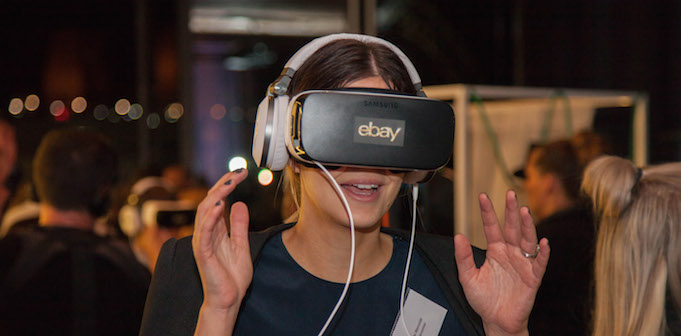
Source: Myer/eBay
The world of virtual reality (VR) can be a daunting and confusing one as a business owner, as many operators have struggled to discover a place for the new age technology.
However, SMEs might need to start thinking about VR sooner than they thought, with a recent report has revealing commonplace VR is closer than we think.
Read more: How virtual reality will change the face of e-commerce
Research by emerging technology analysis firm Telsyte shows an estimated 22.3% of Australian households will have VR systems by 2020 due to the popularity of VR video games.
The report claims over 500,000 VR units will be sold in 2017, with a projected 3.3 million sold in Australia in 2020 – although Telsyte managing director Foad Fadaghi told SmartCompany the number “could be higher”.
“The estimate was a bit conservative, we think that the number could be even higher if companies reduce their pricing,” Fadaghi says.
The spur of interest in VR comes off the back of interest from video gamers, who are hoping virtual reality is the next big thing in the gaming world. Fadaghi believes VR’s application is much broader, calling video gaming an “anchor technology”.
“We believe the opportunity is much broader than video games, and with most new tech you need this anchor technology to drive awareness,” he says.
“Once people become aware, the uses will become apparent.”
The report shows 75% of Australians over the age of 16 are aware of VR, which is a 26% increase from a survey conducted in October last year. Fadaghi attributes this to international brands such as Google and Samsung throwing their weight behind the technology.
Fadaghi says greater awareness will lead to more purchases, as will more easily accessible mobile forms of VR. The report suggests mobile VR will be a “gateway” for consumers and a platform for VR movies, along with 360 video applications like documentaries, e-commerce, and education.
“As with anything, the people who are more aware of it are more likely to purchase. One in ten people we talked to who were aware of it said they intended to purchase a unit,” he says.
“Interest will only grow as there are more applications for it, and an introduction to the tech with mobile VR platforms will also drive purchases.”
It’s still very early days for hopeful businesses that may want to get on board with VR, and Fadaghi says it’s hard to know what the best use for the tech will be. Businesses’ actions will be dictated by “whoever the largest users are”, Fadaghi says.
Right now those users are video gamers, but some businesses are already tackling the tech. Global e-commerce giant eBay has begun to look at virtual shopping experiences with its “VR department store” with Myer.
“There are some interesting concepts coming out from eBay and other online marketplaces with VR shopping malls. Other areas for use include training simulations for staff and customer service options,” Fadaghi says.
“In the end, I think what we’ll see is a vibrant VR ecosystem with video games as the anchor economy.
“It’s definitely early days yet, but there are many opportunities for businesses to give consumers more immersive and wholesome experiences,” he says.


COMMENTS
SmartCompany is committed to hosting lively discussions. Help us keep the conversation useful, interesting and welcoming. We aim to publish comments quickly in the interest of promoting robust conversation, but we’re a small team and we deploy filters to protect against legal risk. Occasionally your comment may be held up while it is being reviewed, but we’re working as fast as we can to keep the conversation rolling.
The SmartCompany comment section is members-only content. Please subscribe to leave a comment.
The SmartCompany comment section is members-only content. Please login to leave a comment.